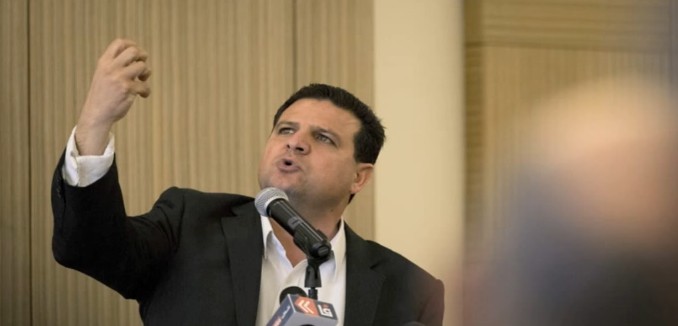Arab-Israeli member of Knesset Ayman Odeh refused to meet with an umbrella group of major Jewish-American organizations because it shares office space with the Jewish Agency, the Jewish Telegraphic Agency (JTA) reported on Thursday.
Odeh was set to address the Conference of Presidents of Major American Jewish Organizations during his week-long visit to the U.S., which also included sit-downs with congressmen and senior administration officials.
A spokeswoman for Odeh, who reportedly reached his decision while in the lobby of the Manhattan building that hosts both offices, said he objects to the Jewish Agency’s role in promoting Jewish immigration to Israel, which he claims comes at the expense of Israel’s Arab population. The JTA observed that the “controversy dealt a blow to Odeh’s message of outreach to U.S. Jews.”
In a statement, the Conference of Presidents decried Odeh’s position, saying:
We received several suggestions that MK Ayman Odeh be invited and, in keeping with the Conference’s decades long tradition of providing a forum for a wide variety of points of view on issues affecting the American Jewish community’s agenda, we extended the invitation.
We have had leaders of virtually every faction and party in the United States, Israel, from friendly and unfriendly countries, and none ever refused to appear. For a member of the Knesset to assert that he will not enter a premises because it has an association with Zionist entities, like the Jewish Agency, is disturbing and dismaying.
The statement concluded, “We hope MK Odeh will reconsider his stance if he, indeed, wants to advance coexistence in Israel and promote understanding abroad.”
Natan Sharansky, chairman of the Jewish Agency, also rejected Odeh’s characterization of his organization, stressing that it services both Jewish and non-Jewish families in Israel.
Thousands of Arab Israeli families enjoy a range of Jewish Agency programs, including our Youth Futures mentorship program, which has placed a particular emphasis on schoolchildren in Israel’s Arab community; Masa Israel Journey and Project TEN, which run programs focused on Arab-Jewish coexistence and on serving underprivileged Arab citizens of Israel; and an innovative Jewish Agency high school opened just this year for Bedouin youth in the Negev. […] Thousands of Arab Israelis have already found their way to The Jewish Agency’s programs and to the dedicated professionals and volunteers who run them. It is high time MK Odeh and his colleagues did the same.
Odeh heads the Joint List, an alliance of major Arab political parties which, at 13 seats, is the third largest faction in the Knesset. The parties under its ticket are dominated by a variety of Islamists, communists, and Arab nationalists.
In an October interview, after he was asked whether the Palestinian terrorists who recently gunned down an Israeli mother and father in front of their four children were engaged in “popular struggle,” Odeh asserted that “the Palestinian people choose how to fight against the occupation.” He then added, “I have no doubt that the popular way is the right way and definitely not armed struggle,” but later emphasized, “I cannot tell the nation how to struggle, where and which target to throw the rock. I do not put red lines on the Arab Palestinian nation.”
While Odeh stressed that he rejected violence in the past, he added that Palestinians have a “right to struggle” for a state based on the 1949 armistice lines. He mentioned that he also supported the first Palestinian intifada, which he called “fully justified” due to the “occupation.” When his interviewer asked him whether rock-throwing was legitimate, Odeh answered, “I always blame the occupation for being guilty.”
Odeh’s stance earned him the wrath of other prominent Arab-Israelis. Ali Salem, the mayor of Nazareth, Israel’s largest Arab-majority city, harangued the Joint List chief on live television in mid-October, telling him, “You destroyed the city. Get out of here.” In an interview earlier that day, Salem revealed that he saw and confronted Odeh at a violent riot the previous week, and blasted Arab leaders for their role in stoking tensions. “I blame the leaders; they are destroying our future, they are destroying coexistence,” he said. Salem noted that while he disapproves of Israeli policy towards the Temple Mount, protests must be made in an appropriate manner. “We need to find a way to live together,” he told the popular news website Walla. “We cannot fight like this. We are damaging ourselves.”
Lucy Aharish, a popular Arab-Israeli news anchor, directed similar criticism towards Arab members of Knesset. In The Violence is Endless, the Hope Never Fades, which was published in the November 2015 issue of The Tower Magazine, Assaf Dudai recounted:
Lucy Aharish, an Israeli-Arab news anchor and journalist, gave the most important criticism of the Arab MKs conduct during the recent wave of terrorism. In an appearance on a current-affairs morning show on Channel 2—Israel’s most-watched television network—Aharish, in an emotional monologue, said, “It’s about time someone from the inside started criticizing and telling [the Arab MKs] the truth to their faces. The leadership is flaccid. No one runs the Arab leadership in Israel.”
Sadly, she is right. None of the Arab MKs condemned the violence. None expressed sorrow or sympathy with the families of the victims. They did not call on their fellow Arabs to stop the violence. Their silence on the matter is bewildering.
[Photo: wochit News / YouTube ]




